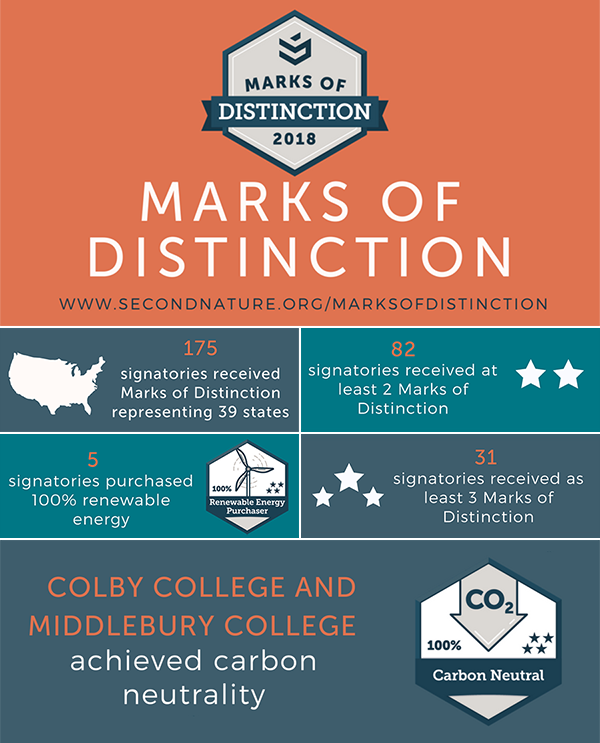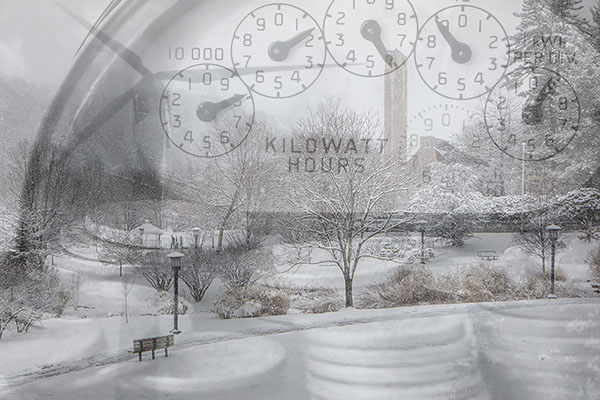BOONE, N.C. — Appalachian State University, along with other colleges and universities across the country, has been recognized as a climate champion by Second Nature, a nonprofit focused on accelerating climate action in and through the higher education sector. Marks of Distinction, a new initiative for Second Nature’s Climate Leadership Network, recognizes a select group of higher education institutions that set high-performance goals and demonstrate and report progress toward those goals.
Appalachian Chancellor Sheri Everts said, “The framework of Second Nature’s Marks of Distinction initiative is perfectly aligned with Appalachian’s practice of setting high-performance goals and supports our climate leadership commitments. This new initiative will help us as we live our climate action goals every day and lead by example.”
For more than a decade, Presidents’ Climate Leadership Commitment signatories, all of which are part of the Climate Leadership Network, have shared their knowledge by developing climate action plans and submitting greenhouse gas inventories to a public Reporting Platform. Until now, this information has never been used to recognize the accomplishments of individual schools.
From 2002-17, Appalachian’s campus grew by 50 percent, yet, according to the university’s 2017 Strategic Energy and Water Management Policy, its energy usage intensity (EUI) reduced by 45 percent — the highest reduction among all schools in the University of North Carolina System.
Patrick Richardson, Appalachian’s energy analyst, and Jim Dees, data and assessment specialist in Appalachian’s Office of Sustainability, said these reductions have allowed the university to avoid $37 million in energy and water costs, and the university is on track to achieve the 2050 goal of carbon neutrality set by the UNC System.
With more than 175 diverse institutions in 39 states receiving Marks of Distinction in 15 categories, Timothy Carter, president of Second Nature, noted, “Recognizing the progress of these select institutions will inspire further action as they lead by example in their communities and for their students. We commend the institutions’ achievement and celebrate the hard work of many individuals who contribute to our shared goals.”
Dr. Dianne Harrison, president of California State University, Northridge (CSUN) and chair of the Climate Leadership Steering Committee, said, “As with many initiatives, higher education is leading the way in communicating and inspiring positive public perception and change for good — this time, for a healthier environment. I am confident that validating climate achievement through the Marks of Distinction will further motivate other institutions to join our movement toward real, measurable climate change actions.”
Progress toward carbon neutrality is being made across all sizes and types of institutions, in very different geographic regions of the country — from Middlebury College and Cornell University in New England, to the University of Oklahoma at Norman.
View a complete list of the higher institutions awarded Marks of Distinction at http://secondnature.org/list-of-awarded-marks-of-distinction.
About Second Nature and the Presidents’ Climate Leadership Commitments
Second Nature is committed to accelerating climate action in, and through, higher education. The nonprofit organization does this by mobilizing a diverse array of higher education institutions to act on bold climate commitments, to scale campus climate initiatives and to create innovative climate solutions. Second Nature aligns, amplifies and bridges the sector’s efforts with other global leaders to advance urgent climate priorities. The Presidents’ Climate Leadership Commitments are a signature program of Second Nature and include a Carbon Commitment to become carbon neutral, a Resilience Commitment, which focuses on climate adaptation and building community capacity, and a Climate Commitment that integrates both. The Climate Leadership Network comprises more than 500 colleges and universities in every state and the District of Columbia that have committed to take action on climate change and prepare students through research and education to solve the challenges of the 21st century. Learn more at http://secondnature.org.
About Appalachian State University
As a premier public institution, Appalachian State University prepares students to lead purposeful lives. App State is one of 17 campuses in the University of North Carolina System, with a national reputation for innovative teaching and opening access to a high-quality, cost-effective education. The university enrolls more than 21,000 students, has a low student-to-faculty ratio and offers more than 150 undergraduate and 80 graduate majors at its Boone and Hickory campuses and through App State Online. Learn more at https://www.appstate.edu.
What do you think?
Share your feedback on this story.






![How NCInnovation Is Rethinking Economic Development in North Carolina [faculty featured]](/_images/_posts/2026/02/rethinking-economic-development-600x400.jpg)








